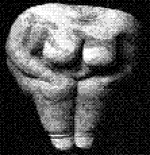
The Great Mother.

The human response to heavy predation was to reproduce often and early. The earlier a human female became a fertile adult, the more likely she was to have offspring before some predator caught her. And once fertile, she would give birth annually. It was perhaps female fertility that ensured the survival of human life. Fertile females were the most valuable humans. They were the Great Mothers who kept up human numbers. Human society was probably largely female, and controlled by women. The main task of females was to raise children. The main task of males was to find food. Because the males were often out foraging, they tended to be caught by predators more quickly than females who tended to stay in a relatively secure cave or camp. Thus males, while born in equal numbers, lived much shorter lives. The sex ratio may have been two or more adult females for every adult male. This sort of sex ratio is ideal for maximum reproduction, because only a few males are needed to fertilize a large number of females.
This time in early human history pushed the female form towards its present ideal - wide-hipped for easy birth, large-breasted for suckling infants. Quite simply, those women who were able to give birth easily, and provide abundant milk for their infants, tended to predominate, because they left more descendants. At the same time, the human male became sturdier, because his task was to carry heavy burdens of food over long distances.
If humans today are unusually highly sexed, by animal standards, it may simply be because for many thousands of years, even millions of years, human society was geared to maximum reproduction. And it was so geared because humans were under intense predator pressure.
If there are few human fossils, it is because most humans were dismembered by predators, and their relatively small bones crushed. There simply wasn't much left to be fossilized.
Periodically, whenever predator pressure eased, human numbers would increase very rapidly, their populations almost doubling every year. The natural refuges would not have been able to support such numbers. Large groups of humans would have been forced to leave, and strike out across predator country in search of new refuges. It is probable that most of these groups, which would have been composed mostly of children, were simply wiped out within a matter of weeks or months.
